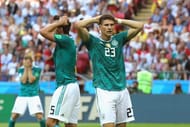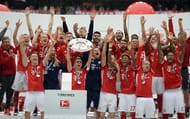Germany is one of the traditionally most dominant teams in the history of football. With four World Cup and three EURO Championship triumphs, they are one of the most successful teams of all time.
They have us provided us with some of the most legendary names to have graced the beautiful game including Michael Ballack, Oliver Kahn, Franz Beckenbauer, Gerd Muller but to name a few.
The Bundesliga is also one of the best leagues in the world, with premier club Bayern Munich being one of the most popular football clubs in the world. In short to say Germany is steeped in a football culture would be to be stating the obvious.
Die Mannschaft won the 2014 World Cup in Brazil, trouncing the hosts by a scandalous scoreline in the semi-final, and a lot of pundits and fans alike listed Germany as joint-favourites alongside Brazil to go all the way in Russia, but acting totally against the script, the defending champions fluffed their lines and bombed at the Mundial, getting eliminated in the group stage.
A lot of dust was expectedly raised, after the shambolic performance, and amidst the furore, Mesut Ozil announced his international retirement, but since then, it has only gotten worse for the European heavyweights.
They followed up their World Cup campaign with a lame showing in the goalless draw with France in their opening Nations League fixture, while their shock 3-0 defeat to Netherland in the latest round of fixtures means the Germans have now gone three competitive fixtures without a goal for the first time in their illustrious history.
The last time they scored a goal in a competitive fixture was when Toni Kroos crashed home a stunning freekick in injury time of the group stage 2-1 victory over Sweden to give his country hope for qualification in what was an ultimately futile attempt.
Since then, Germany has lost 2-0 to South Korea, drawn 0-0 with France before the slump against the Netherlands. Although they did post a 2-1 victory over Peru in a friendly match.
For all the country's pedigree and the quality of players at its disposal, things are not going to plan for Germany, and wide-scale changes must be made across the board to return the country to the summit.
However, to effect those changes, a prognosis must be run to diagnose the root cause of the problem before proposing solutions. Here are three reasons why Germany is struggling at the moment.
#3 They are paying the price for sticking with Joachim Low for so long

Germany does not have a reputation of chopping and changing coaches. As a matter of fact, just ten men have occupied the spot as manager of the national team in over 100 years of its existence.
Incumbent manager Joachim Low got his first taste of the role as assistant to former manager Jurgen Klinsmann in 2006, before occupying the main seat after the legendary former striker's departure after the World Cup hosted on home soil.
Since then, the 58-year-old has earned widespread acclaim for his management of the national team, and in 2014 was voted as the world coach of the year following his exploits in leading Germany to world domination.
By taking charge of the match against the Netherlands, Low made history by becoming the coached who has managed the most matches in German football history, with that being the 168th fixture he has overseen.
In this era of constant hiring and firing, it is an incredibly rare feat, and Joachim Low deserves full praise for the way he has handled one of the more challenging national team jobs.
However, access to technology and improvement in techniques means that football is evolving at a faster rate than at any other time in history, and innovative coaches soon find themselves outdated in a maximum of a ten-year period (just ask Mourinho).
Joachim Low was once a pioneer of modern day tactics, and giving young players a chance, but the increased pressure for sustained success has seen Low go out of his wits, with his substitutions, tactics and lineups at the World Cup roundly criticized.
His decision to leave out Leroy Sane from his World Cup list drew considerable criticism, as did his resolve in starting Manuel Neuer over Ter Stegen despite the former having been out of competitive action for almost nine months drew ire from his compatriots back home.
He has also shown unwavering trust in his World Cup-winning team, sticking with them despite signs of deterioration, with an example being Jerome Boateng who showed at the World Cup and with Bayern this season that he is on a downward spiral, but Low still shockingly adheres to naming him in his starting lineup.
Germany has shown extreme faith in Joachim Low over the years, however, continuing to do so would be detrimental to their football, and it in everyone's best interest for them to part ways.
#2 The core of the team has become stagnant

After dominating both international and club football for most of the 1970s and 1980s, Germany took a backseat in promoting of talent, with the result being that the country went into the 1990s largely relying on aged players, which culminated in a group stage exit at EURO 2000 as defending champions.
After that ouster, German football authorities scoured the world in search of the best practices to lift its football and arrived at the decision to promote youth development.
It was decided that all clubs across the German professional league systems would as a matter of urgency implement a youth team programme which saw to the development and promotion of young players into the senior team.
The consequent effect was that by the end of the decade, most Bundesliga clubs had at its core a young set of German players who had progressed through the ranks.
The national team also benefitted from this, as most beneficiaries of the program were part of the Germany U21 team who won the 2009 European Championship, and gave a good showing of themselves at the World Cup a year later in South Africa.
The crowning glory came in Brazil when Gotze (himself a product of the program) scored the injury-time winner in the final against Argentina. The then 22-year-old was a supporting cast in a crew which had main leads such as Manuel Neuer, Thomas Muller, Jerome Boateng, Toni Kroos and Matts Hummels, who were all young German players that had been blooded in the youth development program.
Eight years after announcing themselves on the global stage, and the crux of the team is still the same. Neuer, Muller, Boateng, Hummels, Reus and Toni Kroos all continue to play key roles in the team, with young players not given an opportunity to handle the baton.
The law of diminishing returns is a well-known principle in the business and economics world, and football is not immune from its consequences.
The German national team has achieved much success over the last decade with largely the same crop of players, and with a dearth of young players being ushered onto the scene like Muller and co were ten years ago, it is only imperative that having achieved such upwards trajectory, there is nowhere else to go but down.
#1 The decreased competition in the Bundesliga

The Bundesliga is one of the best leagues in the world, and once upon a time was extremely competitive, with the period between 2007 and 2011 illustrating this, where four different clubs won the title.
However, those days are long gone, as Bayern Munich have created a hegemony over the league, winning each of the last six titles, with ridiculous margins to second place, and some league campaign being wrapped up as early as March.
This undisputed dominance has rubbed off on the national team, as there is a shortage of quality players contesting on the highest stages at other German clubs other than Bayern Munich, and this has had an adverse effect on the national team in the way the Juventus' dominance of the Serie A has affected the Italian national team negatively.
Send us news tips at football@sportskeeda.com
